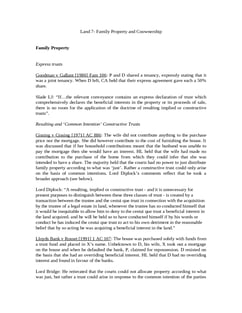Oxley v Hiscock [2004] EWCA Civ 546, [2005] Fam 211
Judgement for the case Oxley v Hiscock
Table Of Contents
KEY POINTS
-
Property encompasses owned assets, from real estate to investments, governed by legal rights and societal norms.
When a property is under one partner's name in an unmarried couple, complexities arise regarding ownership entitlements and equitable distribution.
Unequal financial contributions to property purchases necessitate assessments considering financial input, non-monetary contributions, and agreements between parties.
Quantifying parties' beneficial interests in a property involves examining financial, and non-financial contributions, intentions, and legal frameworks to ensure fair distribution.
Courts apply equitable principles like resulting trusts and proprietary estoppel to resolve property disputes, considering fairness, agreements, and societal context.
FACTS
-
The couple initially cohabited in a house occupied solely by the woman as a secure tenant.
Shortly after, the woman exercised her right to purchase the house using funds provided by the man.
Despite the property being solely in the woman's name, a legal charge was registered in the man's name to safeguard his beneficial interest.
Subsequently, the property was sold, and the proceeds were used to purchase another property solely in the man's name.
The couple contributed £36,300 and £60,700 respectively, with an additional £30,000 borrowed.
-
Despite legal advice, no declaration of beneficial interests was made, and no charge was registered in the woman's name.
The couple lived together on the property for years, contributing to household expenses and property maintenance.
After the relationship ended, the property was sold for £232,000, and the couple moved into separate homes.
Under the Trusts of Land and Appointment of Trustees Act 1996, the woman applied for a declaration that the sale proceeds were held on trust in equal shares.
-
The judge found that the couple had agreed that each would have a beneficial share in the property, primarily registering it in the man's name due to concerns about the woman's former husband's potential claim.
However, there was no express agreement on the extent of the parties' shares.
The judge awarded the woman a half-share in the proceeds, totaling £72,056.
The man appealed, arguing that in the absence of specific evidence of a common intention regarding proportions, the presumption should be a resulting trust based on the proportions of the purchase money provided.
JUDGEMENT
-
The court ruled, partially allowing the appeal:
In cases where unmarried couples buy property, intending to live together but register it in one person's name without discussing beneficial interests, the court assesses if there's evidence of mutual intention for both to have a share.
If such intention is found, the court determines fair shares based on overall dealings with the property, considering contributions and arrangements made for expenses.
Whether framed as a constructive trust or proprietary estoppel, the outcome remains similar—shares are inferred to be determined later based on fairness if not specified initially.
Since no evidence of specific discussions was found, the court considered a fair split: 60% to the man and 40% to the woman, reflecting their financial contributions. An equal split wouldn't address the disparity.
COMMENTARY
-
This case highlights the legal considerations that arise when unmarried couples cohabit and acquire property together.
It reflects the importance of clear communication and formal agreements to avoid disputes over ownership entitlements and equitable distribution.
-
The couple's situation exemplifies the complexities that can arise when one partner's name is solely registered on the property title, despite both parties contributing financially and otherwise to the property's acquisition and maintenance.
Such scenarios often prompt legal inquiries into the parties' intentions and contributions, aiming to ensure fair outcomes.
The court's analysis demonstrates the application of equitable principles, such as resulting trusts and proprietary estoppel, to resolve disputes over beneficial interests in the property.
These principles seek to rectify potential injustices and uphold fairness in property distribution, considering the parties' intentions, actions, and societal context.
The court's ruling on the appeal emphasizes the significance of assessing the entirety of the parties' dealings with the property and considering what distribution would be equitable given their circumstances.
This highlights the court's role in interpreting and applying legal principles to achieve just outcomes in property disputes involving unmarried couples.
For Further Study on Oxley v Hiscock
Need instant answers? Our AI exam tutor is here to help.
Ask questions 🙋 Get answers 📔 It's simple 👁️👄👁️
Our AI is educated by the highest scoring students across all subjects and schools. Join hundreds of your peers today.
Get StartedSimilar Cases
Related Product Samples
These product samples contain the same concepts we cover in this case.

 Since 2010, Oxbridge Notes has been a trusted education marketplace, supplying high-quality materials from top achievers at universities like Oxford, Cambridge, LSE, Harvard, and Yale.
Since 2010, Oxbridge Notes has been a trusted education marketplace, supplying high-quality materials from top achievers at universities like Oxford, Cambridge, LSE, Harvard, and Yale.